

Eli7049. PLEs are an Operating System for Learning. September 13, 2010 by Viplav Baxi This is my first post for PLENK2010 and I am glad to be involved in this discussion.
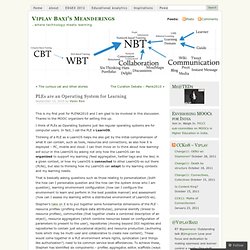
Thanks to the MOOC organizers for setting this up. I think of PLEs as Operating Systems just like regular operating systems are for computer users. In fact, I call the PLE a LearnOS. Thinking of a PLE as a LearnOS helps me also get by the initial comprehension of what it can contain, such as tools, resources and connections, as also how it is deployed – PC, mobile and cloud. That is basically asking questions such as those relating to personalization (both the how can I personalize question and the how can the system know who I am question), learning environment configuration (how can I configure the environment to learn and perform in the best possible manner) and assessment (how can I assess my learning within a distributed environment of LearnOS-es). Recommenders are going to be extremely important, both in terms of what they recommend and what they do not! The_PLE. Definitions of Personal Learning Environment (PLE)
The Personal Learning Environments Blog. Prompted by Derek's recent post I downloaded the latest version of Flock to have a play with.
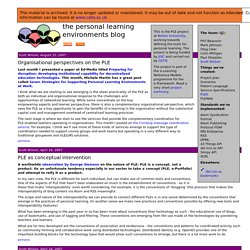
Its come a long way since I first looked at it, at the start of the PLE project, and its interesting to see how both the prototype work on Plex has followed a similar approach to Flock - perhaps a validation of our using a pattern-based approach? In this Flickr photoset (or use this tag instead) I've compared some of the ways Flock and Plex handle the management of web services using a very similar model.
(I've written comments on each screenshot) Not all patterns are implemented in both applications: for example, Plex has no notion of notifications (nor a photo manager), while Flock has no concept of rating resources. However, its easy I think to see how these could operate in both applications. Of course where Flock is currently lacking is the other kinds of instruments relating to people and activity (community?) For more information on Flock, visit. ELI7049. Anatomy of a PLE.
An audit on where stand with PLEs. (via Scott Wilson) Back in 2006 I posted some of my reservations about PLEs.
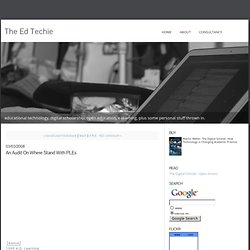
At the time I thought these issues were insurmountable, and largely being ignored by the PLE advocates. Now, I'm more convinced of the possibility, and worth of a PLE, I thought it would be good to see where they stood against my original set of reservations. This of course comes with a massive pre-question 'what do you mean by a PLE? ' (as Alan Levine said in a twitter post, it seems to be a spoke diagram with lots of web 2.0 logos - what can he mean?).
Support. That's not bad progress so far I reckon. Web 2.0 and Personal Learning Environments (PLEs) Crazy week this week.
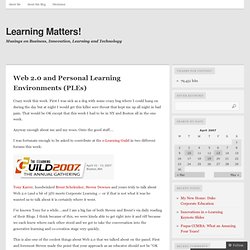
First I was sick as a dog with some crazy bug where I could hang on during the day but at night I would get this killer sore throat that kept me up all night in bad pain. That would be OK except that this week I had to be in NY and Boston all in the one week. Anyway enough about me and my woes. Onto the good stuff…. I was fortunate enough to be asked to contribute at the e-Learning Guild in two different forums this week: Tony Karrer, hoodwinked Brent Schelenker, Steven Downes and yours truly to talk about Web 2.0 (and a bit of 3D) meets Corporate Learning — or if that is not what it was he wanted us to talk about it is certainly where it went. I’ve known Tony for a while….and I am a big fan of both Steven and Brent’s via daily reading of their Blogs. This is also one of the coolest things about Web 2.0 that we talked about on the panel.
Time is on the same channel here: First, get an account on blogger and start to converse publically. Anyway enough about that. Vygotsky, ZPD, Scaffolding, Connectivism and Personal Learning Networks. The Rise of the Personal Learning Environment - One of the interesting developments of web technology has been the increasing focus on individual, personal choices.
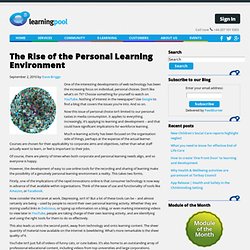
Don’t like what’s on TV? Choose something for yourself to watch on YouTube. Nothing of interest in the newspaper? Use Google to find a blog that covers the issues you’re into. And so on. Now this issue of personal choice isn’t limited to our personal tastes in media consumption. Much e-learning activity has been focused on the organisation side of things, perhaps at the expense of the actual learner. Of course, there are plenty of times when both corporate and personal learning needs align, and so everyone is happy. However, the development of easy to use online tools for the recording and sharing of learning make the possibility of a genuinely personal learning environment a reality.
Firstly, one of the implications of the rapid innovations online is that consumer technology is now way in advance of that available within organisations. Now consider the intranet at work. ELI7049.